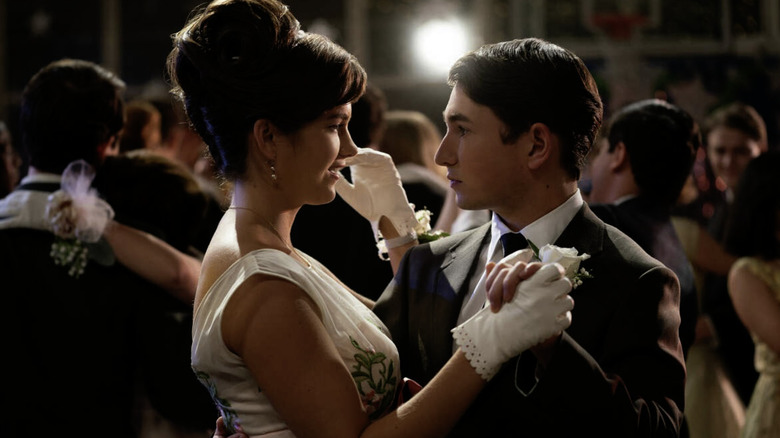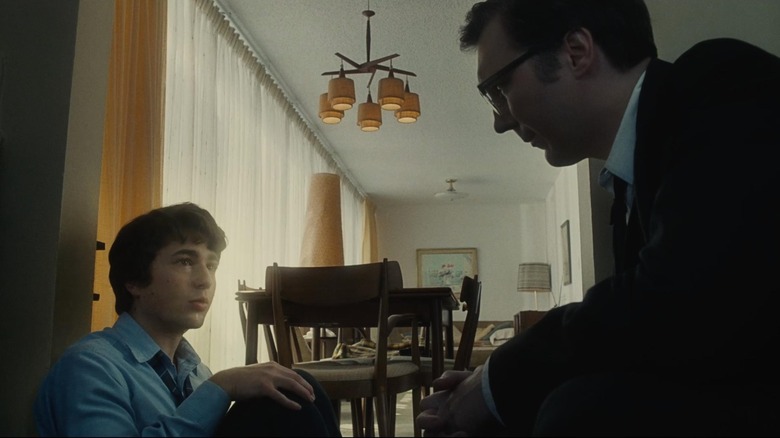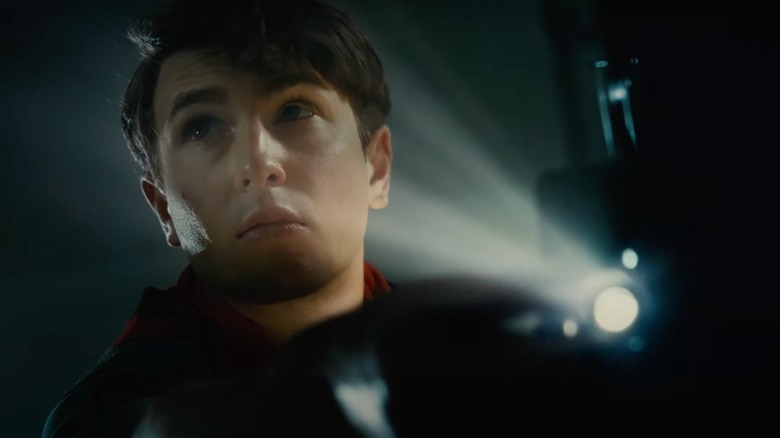Why The Fabelmans Isn't Called 'The Spielbergs'
"The Fabelmans" is Steven Spielberg's most personal film to date. "I've been hiding from this story since I was 17 years old," the filmmaker said last night, accepting his Best Director Golden Globe award. "I've told this story in parts and parcels all through my career ... but I've never had the courage to hit this story head on until Tony Kushner ... sat me down and said 'start telling me all these stories about your life.'"
Since their first pairing together on 2005's "Munich," frequent collaborator Tony Kushner has been just as invested in telling Spielberg's childhood story as the man himself. As an artist who has always been more comfortable approaching themes through the emotional safety of metaphor, it took a screenwriter like Kushner to help Spielberg open up and confront these dredged up memories directly, especially since the recent passing of his mother and father, Leah Adler and Arnold Spielberg.
So, if we all know exactly where this story is based on, why isn't "The Fabelmans" just simply titled, "The Spielbergs?" Kushner has an elaborate and understandable answer to this question, first opening up about it to The Hollywood Reporter in November 2022.
"Spielberg means play-mountain; 'spieler' is an actor in Yiddish, and a 'spiel' can be speech or can be a play. I've always thought how wild that this guy is this great once-in-a-century storyteller who would be called Spielberg, play-mountain," Kushner said, explaining his process of renaming the Spielberg family in fiction.
"I wanted to have some of that meaning, and I've always liked the German word 'fabel,' which means fable. And because the movie is autobiographical for Steven but it isn't an autobiography, it's not a documentary, so there's a fictional element as well. So I thought that 'Fabelman' was a nod to that."
Objectivity through distance
In the January 2023 issue of Total Film Magazine, Kushner revealed more about the process of mapping out the original draft of "The Fabelmans," which started taking proper shape in Spring of 2020. "I asked him all the questions that I could think of asking him about," says Kushner. "And we sort of covered everything in his childhood. It felt overwhelming to both of us. How do we extract a coherent story out of this vast amount of material?"
But life's nothing like the movies. In order to stuff the most significant memories of Spielberg's childhood into the flow of a narrative feature film, the only natural solution for Kusher was to reshape, exaggerate, and fictionalize some events in the filmmaker's life. Kushner explained his dedication to staying true to Spielberg's story amongst all the artistic freedoms:
"I said, 'I think I want to take it, and have your permission to play around with it, and move things around, and also really try to figure out motivations and character arcs. I'm going to try to adhere to what you told me, but it's going to be a work of fiction.'"
The result is something closely personal and semi-autobiographical, but with just enough distance to allow some room for universality. From New Jersey, to Arizona and Northern California, Spielberg's frequently uprooted and chaotic life comes through, it's just altered enough to feel freeing. "He said, 'It's really weird. It's my life, but it's not my life.' Which I think is exactly the point." Kushner explained, "It gave him a certain kind of cooling objectivity that he wouldn't have had otherwise because it's really his story and his life. And then we boiled it down."
Through fictionalization, Spielberg's story becomes universal
Though there are plenty of super fans of Spielberg that have lovingly researched about the filmmaker's personal life and have prior insights into the story "The Fabelmans" sought out to tell, there was a specific importance to Kushner and Spielberg that the film not become too insular. If this movie was going to land with audiences, it would need to stand alone, even without all the personal baggage and self-fulfillment being brought into the creative process.
"I felt that turning it into a kind of fiction was important," Kushner told Total Film. "What we said all along is, unless it moves people and means something to people who have no feeling at all about filmmaking and don't know about you or care about you or your movies — unless it works for somebody like that, we shouldn't do it. It can't be one for the fanbase or one for the family or something like that. It really needs to justify its existence. And he was very much in agreement with that."
One of Spielberg's main motivations to create "The Fabelmans" was to acknowledge his place in pop culture as one of our finest directors, and knock down the illusion that he is a uniquely special individual. Sammy Fabelman might be an avatar for Steven Spielberg, but he is also a curious-minded viewer who finds themselves understanding the world through movies. In a sense, though "The Fabelmans" is the most openly vulnerable Spielberg has ever been, he's still doing what he's always done with his works — bottling up an emotion and handing it directly to his audience.


